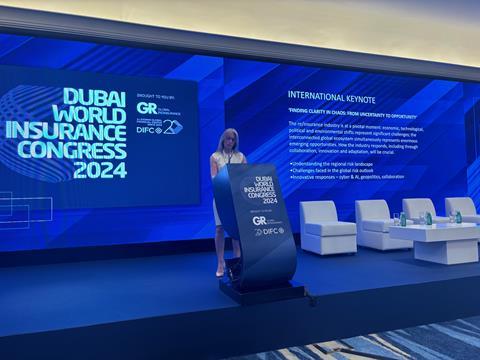As temperatures across the globe continue to rise, the re/insurance industry must play a vital role in helping the green transition, says Vicky Carter, deputy chair of Lloyd’s and chairman, global capital solutions, international, Guy Carpenter.
”Due to the climate crisis, the risk landscape has been transformed over the last two decades, and with 90% of the world’s global economy being committed to decarbonisation, the climate crisis is on everyone’s agenda,” said Vicky Carter, deputy chair of Lloyd’s, and chairman, global capital solutions, international at Guy Carpenter.
She was delivering a keynote speech at the Dubai World Insurance Congress, examining how the industry could find clarity in chaos and thus move from uncertainty to opportunity.

She argued that insuring the climate transition is arguably one of the greatest opportunities for insurers and reinsurers today.
She said: “We are on a trajectory to exceed the 1.5-degree threshold, as well as many other related tipping points by the early 2030s – so insurance has a unique role to play in enabling, investing in and convening to support multiple industries as they take climate-positive action in the transition to a more resilient future.”
In terms of the insurance industry’s contribution, she said that so far offshore wind and solar have been leading the solutions, with each now having established insurance markets.
However, where she’s seeing demand increasing is across technologies like carbon construction and storage (CSS), hydrogen, sustainable fuels, low-carbon construction, and more recently, a growing demand for carbon offset credits insurance.
She said: “One area of major opportunity in this respect is green energy… This is especially true in this region where significant investments into hydrogen are being made by the energy majors. An exceptional opportunity exists for our industry to support this expansion and facilitate the shift towards sustainability.”
To do this, Carter argued that the insurance industry must continue working with energy firms, financial services, and policyholders to understand, profile, and sustainably price risks that support the development of insurance solutions for these critical technologies.
She concluded: “Responding to the complex and uncertain global outlook requires bold cross-sector collaboration. Many of the risks we face are too big for any one sector to address alone. The insurance industry has already facilitated work across finance, industry, government, regulation, and academia.
“We need to innovate relentlessly, invest responsibly and insure inclusively. If we keep collaborating and adapting at the scale and speed seen in the industry so far – we can shape a future that is more sustainable, resilient and inclusive.”










No comments yet